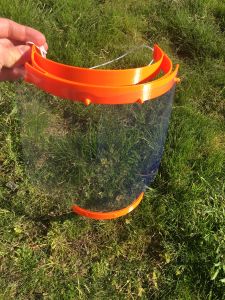The number of SARS-CoV-2 infections in Germany presently is more than 130,000, it is increasing worldwide every day. Also hospitals in and around Karlsruhe need sufficient protective equipment. Karlsruhe Institute of Technology (KIT) now wishes to support them in managing the Corona crisis by providing in kind contributions and scientific-technical services. The corre-sponding requests for and offers of help are coordinated cen-trally. So far, 200 face shields have been produced by 3D print-ing for the ViDia hospitals under a joint project with Karlsruhe University of Applied Sciences. More face shields will follow. In addition, several boxes with respiratory masks, gloves, and protective gowns were handed over to the Fire Protection Au-thority of the City of Karlsruhe for further distribution. Moreo-ver, a Chinese partner institute has promised to donate to KIT 20,000 respiratory masks. These will then be forwarded to the municipal hospital and other institutions of the city.
“We understand that KIT’s social responsibility does not only cover research and academic education. We are deeply rooted in the region of Karlsruhe and there is no doubt that we want to contribute to the local efforts to cope with the Corona crisis,” says the Presi-dent of KIT, Professor Holger Hanselka. “I am very happy that we can hand over to the hospitals in Karlsruhe respiratory masks and face shields, among others. Let me thank all parties involved for their high commitment and solidarity.” At KIT, requests for and of-fers of help are pooled centrally and coordinated by the Vice-President for Innovation and International Affairs, Professor Thomas Hirth.
From the 3D Printer: Face Shields for ViDia Hospitals
In case of direct contact with patients infected by COVID-19, plastic face shields are very helpful and should be worn by physicians and medical staff in addition to respiratory masks. At the moment, such face shields are hardly available anymore or can only be bought at inflated prices. For this reason, the Karlsruhe ViDia hospitals asked for support. KIT’s Institute of Production Science (wbk) and the Institute of Product Engineering (IPEK), together with Karlsruhe University of Applied Sciences, quickly established a “production network” that provides the ViDia hospitals with face shields from 3D printers.
Using an online template, the partners developed a 3D printing pro-cess. The face shields are produced by 30 printers normally used for prototype construction and research relating to additive manu-facture. Printing of one face shield currently takes about three hours. So far, KIT scientists have delivered 200 face shields to the ViDia hospitals, more will follow soon. Meanwhile, other institutes of KIT, such as the Institute of Fluid Mechanics (ISTM) and the Physikalisches Institut, have joined the network.
“We are very happy and grateful for the good and unbureaucratic cooperation with KIT and Karlsruhe University of Applied Sciences. In this extraordinary situation, it is very encouraging to experience quick support by local institutions,” says Richard Wentges, CEO of ViDia Christliche Kliniken Karlsruhe.
20,000 Respiratory Masks for City Institutions
In addition, KIT will be donated 20,000 respiratory masks by the South Western Institute of Physics of the Chinese Academy of En-gineering Physics in Chengdu, a partner institute of KIT in a re-search program of the Helmholtz Association. As soon as the masks will arrive in Karlsruhe, KIT will hand them over to the munic-ipal hospital and other municipal institutions, together with additional respiratory masks and gloves from KIT’s internal stocks.
"On behalf of the employees of Städtisches Klinikum Karlsruhe, who use these materials every day in the treatment of Covid-19 patients, I would like to thank the KIT for this emergency aid," says the Medi-cal Director of the Städtisches Klinikum, Professor Uwe Spetzger.
In addition, wbk delivered 140 face shields to the Karlsruhe section of the German Red Cross for its 80 emergency medical care staff members.

Researchers of KIT’s Institute for Automation and Applied Informat-ics (IAI) use their 15 3D printers to also produce face shields. They support the Germany-wide initiative Maker vs. Virus that brings together people and organizations needing protective equipment with “makers” producing this equipment.
Together with ZKM, another group of employees of the FZI Re-search Center for Information Technology, an innovation partner of KIT, delivered 275 face shields to the municipal hospital.
“This high voluntary commitment across many institutions is great,” says Professor Thomas Hirth, KIT Vice-President for Innovation and International Affairs, who coordinates the relief action on behalf of entire KIT. “We want to support institutions in the region with both in kind contributions and scientific-technical services. To help as quick-ly, effectively, and specifically as possible, we will centrally pool ex-ternal requests for and internal offers of help.” A project team – in agreement with the Crisis Unit of KIT – will coordinate scientific-technical support and transportation of the in kind contributions to external recipients.
Being “The University in the Helmholtz Association”, KIT creates and imparts knowledge for the society and the environment. It is the objective to make significant contributions to the global challenges in the fields of energy, mobility, and information. For this, about 10,000 employees cooperate in a broad range of disciplines in natural sciences, engineering sciences, economics, and the humanities and social sciences. KIT prepares its 22,800 students for responsible tasks in society, industry, and science by offering research-based study programs. Innovation efforts at KIT build a bridge between important scientific findings and their application for the benefit of society, economic prosperity, and the preservation of our natural basis of life. KIT is one of the German universities of excellence.

